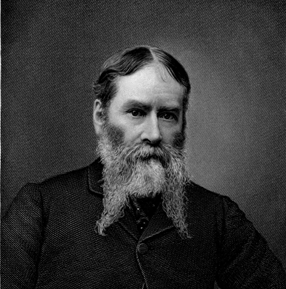To the Dandelion
Dear common flower, that grow’st beside the way,
Fringing the dusty road with harmless gold,
First pledge of blithesome May,
Which children pluck, and full of pride, uphold,
High-hearted buccaneers, o’erjoyed that they
Eldorado in the grass have found,
Which not the rich earth’s ample round
May match in wealth, thou art more dear to me
Than all the prouder summer-blooms may be.
Gold such as thine ne’er drew the Spanish prow
Through the primeval hush of Indian seas,
Nor wrinkled the lean brow
Of age, to rob the lover’s heart of ease;
’Tis the Spring’s largess, which she scatters now
To rich and poor alike, with lavish hand,
Though most heart never understand
To take it at God’s value, but pass by
The offered wealth with unrewarded eye.
Thou art my tropics and mine Italy;
To look at thee unlocks a warmer clime;
The eyes thou givest me
Are in the heart, and heed not space or time:
Not in mid June the golden-cuirassed bee
Feels a more summer-like warm ravishment
In the white lily’s breezy tent,
His fragrant Sybaris, than I, when first
From the dark green thy yellow circles burst.
Then think I of deep shadows on the grass,
Of meadows where in sun the cattle graze,
Where, as the breezes pass,
The gleaming rushes lean a thousand ways,
Of leaves that slumber in a cloud mass,
Or whiten in the wind, of waters blue
That from the distance sparkle through
Some woodland gap, and of a sky above,
Where one white cloud like a stray lamb doth move.
My childhood’s earliest thoughts are linked with thee;
The sight of thee calls back the robin’s song,
Who, from the dark old tree
Beside the door, sang clearly all day long,
And I, secure in childish piety,
Listened as if I heard an angel sing
With news from heaven, which he could bring
Fresh every day to my untainted ears
When birds and flowers and I were happy peers.
How like a prodigal doth nature seem,
When thou, for all thy gold, so common art!
Thou teachest me to deem
More sacredly of every human heart,
Since each reflects in joy its scanty gleam
Of heaven, and could some wondrous secret show,
Did we but pay the love we owe,
And with a child’s undoubting wisdom look
On all these living pages of God’s book.
This poem is in the public domain. Published in Poem-a-Day on March 3, 2024, by the Academy of American Poets.
“To the Dandelion” first appeared in James Russell Lowell’s second poetry collection, Poems (John Owen,1843), and is included in Poems of James Russell Lowell (Oxford University Press, 1917). American critic and poet Richard Henry Stoddard contextualizes Lowell’s second book, stating that Lowell’s early work “revealed an active and fertile mind, a quick sympathy with and a clear comprehension of sorrow and suffering, a profound belief in the brotherhood of man, the recognition of high ideals in private and public conduct, [the] courage of convictions and contempt for creeds, and, present everywhere, though rather felt than seen, an instinctive love of nature.” Stoddard then observes Lowell during this era of his writing saying, “We have Mr. Lowell in the moods and limitations of his early manhood. He was serious rather than thoughtful, speculative rather than meditative. He felt more than he knew, and writing from inspiration rather than deliberation, he was more fervid than finished.” Lowell became the editor of the North American Review twenty-one years later, after the publication of Miscellaneous Poems, and wrote ten poetry collections and several essay collections.

